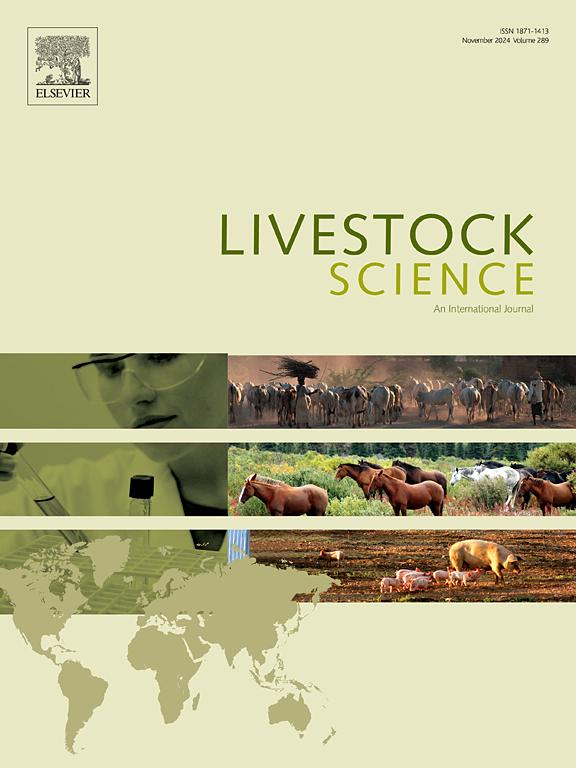Ameliorative effects of different additives on growth, meat quality, and histological indices in heat-stressed broilers exposed to prolonged fasting
IF 1.9
3区 农林科学
Q2 AGRICULTURE, DAIRY & ANIMAL SCIENCE
引用次数: 0
Abstract
While 'fasting' is a common practice for reducing heat stress (HS) in broilers, it may negatively impact the birds' growth and other physiological functions. This study aimed to evaluate the beneficial effects of four different biological additives—prebiotic, probiotic, synbiotic, and betaine—on reducing HS as well as the negative effects of fasting in broiler chickens raised in the hot and humid conditions of Bangladesh. A total of 600 mixed-sex day-old chicks were divided into six treatment groups: T1 = received a basal diet with no fasting and no supplementation (NF-NS); the other five groups underwent 8- h fasting, with T2 = no supplementation (F8-NS), T3 = ‘prebiotic’ supplement (F8-PRE), T4 = ‘probiotic’ supplement (F8-PRO), T5 = ‘synbiotic’ supplement (F8-SYN), and finally, T6 = ‘betaine’ supplement (F8-BETA). Each treatment was replicated five times. All the birds were raised under identical care and management with ad libitum feed supply until the third week of age and subsequently underwent different treatment applications. Data on growth, carcass metrics, meat quality, gut histomorphology, and cost-benefit parameters were recorded and analyzed using SPSS. Results revealed significantly increased (P < 0.01) body weight, body weight gain, and better FCR with various supplementations compared to control (NF-NS or F8-NS) groups. The abdominal fat (%) was decreased, however, various meat quality indices, gut histomorphology, and the net profit per kg of live birds were significantly enhanced (P < 0.01) with the incorporation of different supplements. In conclusion, administering probiotics, synbiotics, and betaine via drinking water to broilers fasted for 8 h may effectively alleviate HS and the adverse effects of fasting, resulting in improved growth, carcass characteristics, and intestinal histomorphology in broilers raised in the hot and humid climate of Bangladesh. Of the four additives evaluated, the probiotic demonstrated better performance and economic return.
不同添加剂对长时间禁食热应激肉鸡生长、肉品质和组织学指标的改善作用
虽然“禁食”是减少肉鸡热应激(HS)的常见做法,但它可能对鸟类的生长和其他生理功能产生负面影响。本研究旨在评估四种不同的生物添加剂——益生元、益生菌、合成菌和甜菜碱——对减少HS的有益影响,以及在孟加拉国湿热条件下饲养的肉鸡禁食的负面影响。将600只混合性别日龄雏鸡分为6个处理组:T1 =饲喂基础饲粮,不禁食不补充(NF-NS);其他五组禁食8小时,T2 =不补充(F8-NS), T3 =“益生元”补充(F8-PRE), T4 =“益生菌”补充(F8-PRO), T5 =“合成”补充(F8-SYN),最后T6 =“甜菜碱”补充(F8-BETA)。每个治疗重复5次。所有雏鸟在相同的护理和管理下饲养,自由饲料供应,直到第三周龄,随后进行不同的处理。记录生长、胴体指标、肉质、肠道组织形态学和成本效益参数的数据,并使用SPSS软件进行分析。结果显示(P <;与对照组(NF-NS组或F8-NS组)相比,不同添加物组的体重、体重增加和FCR均有所提高。腹部脂肪(%)降低,但各项肉品质指标、肠道组织形态和每公斤活禽净利润显著提高(P <;0.01)。综上所述,在孟加拉国湿热气候条件下饲养的肉仔鸡,在饮水中添加益生菌、合成菌和甜菜碱可有效缓解HS和禁食的不良影响,从而改善其生长、胴体特性和肠道组织形态。在评价的四种添加剂中,益生菌表现出更好的性能和经济效益。
本文章由计算机程序翻译,如有差异,请以英文原文为准。
求助全文
约1分钟内获得全文
求助全文
来源期刊

Livestock Science
农林科学-奶制品与动物科学
CiteScore
4.30
自引率
5.60%
发文量
237
审稿时长
3 months
期刊介绍:
Livestock Science promotes the sound development of the livestock sector by publishing original, peer-reviewed research and review articles covering all aspects of this broad field. The journal welcomes submissions on the avant-garde areas of animal genetics, breeding, growth, reproduction, nutrition, physiology, and behaviour in addition to genetic resources, welfare, ethics, health, management and production systems. The high-quality content of this journal reflects the truly international nature of this broad area of research.
 求助内容:
求助内容: 应助结果提醒方式:
应助结果提醒方式:


